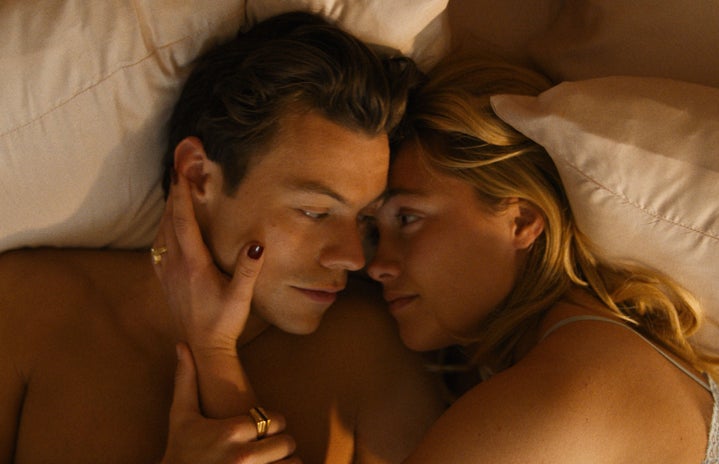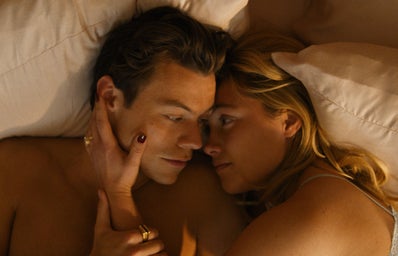Everyone had a lot to say about the movie Don’t Worry Darling, when it came out September 2022. The thing is, most of what they had to say was not about the movie, it was about the people behind it. Although over a year late, I recently watched this movie for the first time. Spoiler alert, I think I discovered my new favorite movie. Spoiler Alert for the movie as well if, like me, you took this long to watch it. My summary will not be a tenth as good as the real thing.
The movie follows Alice (Florence Pugh), who is a housewife to Jack (Harry Styles) in a utopian town that adheres to the gender roles of the 1950s. Jack and the other men go to work everyday outside of town at “Headquarters” for the “Victory Project,” where the wives are not allowed to go under any circumstances, nor know anything about. Despite all the mystery, the residents of the town seem to believe that they are changing the world, and there is no place where they could be more happy. Frank (Chris Pine) is the creator of the Victory Project and the promoter of these beliefs. The residents seem to worship him. Alice goes about her days but eventually through a series of odd occurrences and conversations, realizes that the world they are living in is not real, and that she and the other wives are trapped there. The movie ends with the reveal that the town of Victory is a simulation pulled off through high tech devices that are installed, by the husbands, into their homes in the real, modern world.
This movie has got me hook line and sinker. In the span of two weeks, I’ve watched it five times. The reason this movie is so intriguing to me is because it is the first take on feminism and patriarchy that I’ve seen in awhile that didn’t feel stale. No offense to Barbie (2023), which is a movie that I also thoroughly enjoyed, but Don’t Worry Darling just scratched a feminist itch for me that Barbie didn’t, that no movie has for awhile.
I really enjoyed the sly directing style in this movie from Olivia Wilde. I am a sucker for details in movies, little things that tie into an earlier or later moment. Those things are like the thread tying a movie together, making it much stronger. This film had many of those, from the writing as well as the directing. One thing the moments showcased was the strong ties between the wives of Victory. Even though the wives in Victory are made to feel like their lives are perfect, there are several moments where they seem to wordlessly communicate. Beautiful moments where they simultaneously hesitate at a clue to the truth about their world, subtly defying their husbands or being unable to confirm that they don’t feel “trapped” when Frank asks.
This movie masterfully used these threads to reinforce its themes. Like watching Alice tie Jack’s tie for him. Normally romantic, right? Not when it comes right after Frank gives a speech to the residents of Victory town and talks about how much the men ask of their wives. He frames it as though he is thanking them, but his tone is laced with condescension. Watching Alice tie Jack’s tie for him highlighted everything she does for him, thanklessly, to the point where he can’t even maintain his own person.
Speaking of thankless tasks, we barrel right into one of the most controversial aspects of the movie, the sex. The first sexual scene in this movie happens as Jack is coming home from work, after we watched Alice in the house all day, cooking and cleaning. Jack comes through the door, and in less than a minute he and Alice are having sex on the dinner table. While there is plenty of room for critiques on this scene, as I watched Alice push the elaborate dinner she made off the table while they made love, it perfectly demonstrated the unfair dynamics in their relationship.
The thick strokes of directing and writing in a movie can make it, but the detailed work that is put into fleshing each character out is often hit or miss. In this movie, several felt like a hit. First and foremost, we have Alice, our main character played by Florence Pugh. It absolutely goes without saying that Pugh’s performance as Alice was wonderful. Alice’s journey of discovery in Victory took me to the edge of my seat wanting answers. The way the movie makes you lament over if this is just the story of Alice going crazy, and then shows you that of course she wasn’t, is a beautiful way to make the viewer understand the patriarchy. The antagonist to the heroine of Alice is Frank, in all his slimy glory. Frank seemed to be considering every word that came out of his mouth until the very breath before he said it, showing the meticulous nature of his control.
One of my favorite things a piece of cinema can do is at first make you hate a character, and then turn around and make you like them, or at least accept some redeeming qualities. This movie did that wonderfully with Bunny’s character, Alice’s best friend, played by director Olivia Wilde. At one point Alice tries to tell Bunny how she is feelinging about where they live, and Bunny brutally shuts her down, making the viewer feel just as betrayed as Alice. Then, when Alice finds herself in danger of being killed by Frank’s goons after killing her own husband Jack, it’s Bunny who reveals that she knew the secret of their world, and that Alice is in grave danger. She vehemently pushes Alice to leave, and even fights off her own husband when he tries to stop her. Bunny’s love for her friend ultimately overrides her motivations to maintain the integrity of the fake world, motivations that include being able to stay in a place where her children didn’t die. Redemptions are one of the hardest things to do in cinema, and pulling one off in a movie is something the Don’t Worry Darling has done beautifully.
A true sign of a great movie is one that gets better as you watch it, and that is certainly true here. The end of the movie is the best part, and not because it’s over. Alice begins to remember her life in the real world, as a resident MD working long shifts after Jack lost his job. The film gives us a comparison between the scene of Jack coming home from work in Victory, and a scene in the real world of Alice coming home from work. The difference is heartbreaking. Jack is insensitive and ignorant towards Alice as she comes home, blaming her for not communicating from the O.R. about dinner, and not being supportive of her exhaustion after a thirty hour shift. His apathy towards her is the opposite of what he received in Victory, and the double standards are heartbreakingly displayed.
When Alice confronts Jack about this, there is a long, pregnant pause after she first cried out in confusion at her memory. This pause catapults you into the fight that leads to Alice killing Jack after a shaky declaration of “oh god” when realizing that this is the man she fell in love with. The final sequence is a car chase as Alice drives away, and ends up escaping. That’s right, this movie is even complete with exploding cars and it works.
It’s never too late to enjoy a movie, and I cannot recommend this one enough. Take this opportunity to watch it without the media’s drama bombarding you, and I hope you appreciate the art as much as I do.


